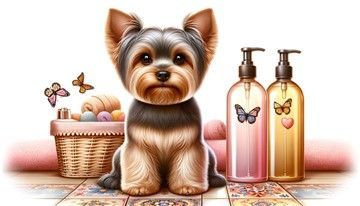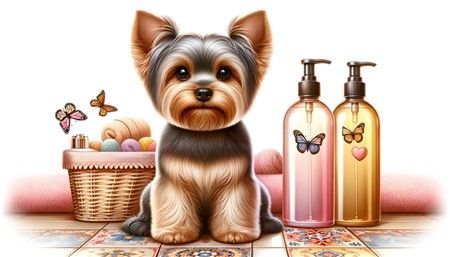Yorkshire Terrier Care Tips
This is the main care page. Keep reading for the top 10 most important care tips for taking excellent care of your Yorkshire Terrier of any age.
Or, if you were looking for something different, jump down to see our list of Additional Care Articles, which includes tips specifically for puppies, tips for seniors, and detailed advice on specific topics.
Overview
- Always use a harness, not a collar.
- Take good care of your Yorkie's teeth.
- Offer high-quality, all-natural food.
- Offer spring or filtered water.
- Ensure regular exercise.
- Use quality coat products.
- Prioritize training essentials.
- Implement socialization training.
- Safeguard your home
- Protect the paw and nose care.
Please note: YorkieInfoCenter is reader-supported, and some of the product suggestions on this page are affiliate links. As an Amazon Associate we earn from qualifying purchases. This is at no extra cost to you and helps us continue providing free, high-quality information.
Care Tip #1: Always Use a Harness, not a Collar.
Yorkshire Terriers are prone to tracheal collapse, a condition where the supportive structures around the windpipe, known as tracheal rings, progressively lose strength. This weakening causes the windpipe to narrow, leading to symptoms such as coughing, difficulty breathing, and other serious respiratory issues. This condition is painful and presents challenges and complexities in treatment.
The use of a collar, particularly when it's attached to a leash and used to pull or control a Yorkshire Terrier, can put additional stress on their neck and trachea. This pressure can exacerbate or even contribute to the onset of tracheal collapse in susceptible breeds like Yorkshire Terriers.
For this reason, using a harness instead of a collar is strongly recommended. Harness vests distribute pressure over a dog’s shoulders, chest and back leaving the neck free. A harness that we recommend is the EcoBark Step-in Harness which starts at size triple-small, fitting dogs in the 2 to 3 lb. range.
Learn more about Yorkshire Terrier Harnesses or continue reading below for more care tips.
Care Tip #2: Take Good Care of Your Yorkie’s Teeth.
Taking good care of your Yorkie's teeth is one of the most important care tips for a reason. Yorkshire Terriers are notably susceptible to gum disease, tooth decay, and tooth loss due to their small mouths, which can lead to overcrowding of teeth. This overcrowding makes it easier for plaque and tartar to build up, creating an environment where bacteria can thrive and lead to periodontal disease. Not only is this condition painful, but it can also severely impact a Yorkie’s overall health. Bacteria from the mouth can enter the bloodstream, potentially affecting major organs and leading to more severe health problems.
Regular dental care should include brushing your Yorkie's teeth daily with canine toothbrush or a finger-tip brush and dog-specific toothpaste like that found with the Arm & Hammer for Pets Complete Care Dental Kit, which is sized for small dogs and puppies (of larger breeds). Additional dental care includes using water supplements or sprays, daily dental chews, and keeping routine dental check-ups with a veterinarian.
Learn more about Yorkshire Terrier Dental by jumping down to our 'Additional Care Articles’ or continue reading for more care tips.
Care Tip #3: Offer high-quality, all-natural food.
Providing your Yorkshire Terrier with all-natural food is essential for their health and longevity. Artificial additives (color dyes, flavor enhancers, and chemical preservatives) in commercial dog foods can cause allergic reactions and digestive issues, possibly leading to even more severe health conditions. Fillers like corn, wheat, and soy, which add little nutritional value, may also cause digestive problems. Avoiding subpar meats and meat by-products, often made from low-quality ingredients, is vital as they lack the essential nutrients found in high-quality, whole meats.
Choose a dry kibble, as this is best for dental health, that emphasizes natural ingredients and specifies the type of meat used, such as chicken, beef, or fish. Ensure the kibble is 100% all-natural, with no synthetic additives.
One brand we recommend is Wellness Complete Health for Small Breeds (there are puppy, adult, and senior formulas as well as grain and grain-free) and they have a good line of both dry snacks for feeding in between meals and chewy training treats as well.
Read more about Yorkshire Terrier Feeding Guidelines or continue reading below for more care tips
Care Tip #4: Offer spring or filtered water.
Unfiltered tap water may contain harmful contaminants such as chlorine, lead, mercury, and notably chromium-6, known for its carcinogenic risks. Studies like those by the Environment Working Group reveal chromium-6's widespread presence in U.S. tap water, posing significant health threats. This is especially concerning for small breeds like Yorkshire Terriers, whose size and unique physiology (high metabolic rate and low body mass) heighten their vulnerability to these contaminants. Chronic exposure can cause gastrointestinal problems, skin issues, and potentially increase cancer risk.
By providing your Yorkie with spring or filtered water, you can reduce their exposure to these potentially harmful contaminants. Filtered water goes through a purification process that removes or significantly reduces impurities. Providing clean water effortlessly can be achieved through bottled spring water. Additionally, there is a variety of filtration solutions available, from handheld pitcher filters, such as the ZeroWater Filter Pitcher, to comprehensive under-sink filtration systems.
Care Tip #5: Ensure Regular Exercise for Your Yorkie
Despite their compact size, Yorkshire Terriers require regular exercise to maintain their health and happiness. The misconception that their small stature means they need minimum physical activity couldn't be further from the truth; Yorkies, much like larger breeds, thrive on consistent exercise.
Daily physical activities for Yorkshire Terriers offer comprehensive benefits: It bolsters heart health, enhances muscle strength, ensures joint flexibility, and promotes digestive health. Additionally, regular exercise contributes significantly to a Yorkie’s mental well-being, helping to alleviate anxiety, curb boredom, and prevent destructive behaviors.
Many Yorkies have lots of energy to burn off, necessitating exercise routines that match their size and vigor. Generally, it's recommended to take a Yorkshire Terrier for walks at least twice a day, with the possibility of short, playful cardio sessions to keep things interesting and cater to their energetic nature.
Learn more about Exercise Requirements by jumping down to our 'Additional Care Articles’
or continue reading for more care tips.
Care Tip #6: Use quality coat products.
For Yorkshire Terriers, choosing the right coat care products like shampoo, conditioner, and coat spray is essential due to their sensitive skin. Using products with harsh detergents can lead to issues such as dryness, itchiness, and rashes, while those designed for sensitive skin help maintain skin health and coat shine. It's important to select items with a balanced pH of 6.5 to 7.5, aligning with a dog's skin pH, and opt for plant-based cleansers free from sulfates to preserve natural oils, ensuring the skin stays hydrated and the coat remains glossy.
It is recommended to bathe a Yorkie every three weeks, incorporating a wash-out conditioner after shampooing. Allow the conditioner to penetrate for up to 10 minutes before rinsing thoroughly with lukewarm water to keep their skin and coat in optimal condition.
A shampoo and conditioner that we like a lot is Earthbath All-Natural Oatmeal and Aloe, which is exceptional at both preventing and treating skin issues.
Read more about Shampoo and Coat Products for Yorkshire Terriers or continue reading for more care tips.
Care Tip #7: Prioritize Training Essentials
Training a Yorkshire Terrier is an essential aspect of their care. Sometimes due to their small size and being so easy to pick up and carry, Yorkies may miss out on basic training such as commands and heeling. This oversight can lead to undesirable behaviors, including stubbornness, excessive barking, and other behavioral challenges.
Proper training not only instills good manners but also strengthens the bond between you and your canine family member, enhancing communication and ensuring their safety in various situations.
To address these training needs, consider enrolling your Yorkie in classes offered by local organizations, such as the ASPCA, where they can learn in a structured environment and socialize with other dogs.
Care Tip #8: Implement Socialization Training
Socialization training is an important part of caring for a Yorkshire Terrier, aiming to create a confident and well-adjusted pet through exposure to diverse people, environments, and situations in a safe, controlled way. This process enhances their adaptability and reduces fear and aggressive behavior in new settings. However, a Yorkie’s' small size presents challenges, as busy areas with lots of foot traffic pose risks of injury. To safely socialize your Yorkie, use a harness and leash for control and opt for less crowded, pet-friendly locations like weekday pet stores, cafes, or outdoor events, where you can easily find open spaces.
When introducing your Yorkie to other dogs, prioritize safety due to their vulnerability to injuries from larger breeds. Schedule playdates with similarly sized dogs in controlled environments to ensure safe and enjoyable interactions. This balanced approach to socialization is key to nurturing a sociable, happy Yorkshire Terrier.
Care Tip #9: Safeguard Your Home
Ensuring your home is a safe haven for your Yorkshire Terrier is paramount, given their adventurous spirit and diminutive size. This toy breed is prone to injuries such as joint dislocations, sprains or even broken bones from attempting to jump off (relatively) high furniture. To mitigate these risks, consider incorporating small pet steps or ramps like the Sweetbin Wooden Adjustable pet Ramp near their favored spots (like sofas, chairs, or bed) to provide safe access and minimize the risk of injury. Additionally, if your home features a staircase, installing a gate can prevent accidental falls, adding an extra layer of safety.
Regularly dog-proofing the house also plays a role in proper care. Routinely check floors to remove small objects that can pose choking hazards. Electrical cords should be securely tucked away or encased in cord protectors like the Small Pet Select Heavy-Duty Cord Cover to prevent chewing, which can lead to electrocution.
Secure small trash cans and lower cabinets and don't forget about doing regular sweeps of the yard to check for and remove any debris, sharp objects, or hazardous materials that could pose a risk to your Yorkie's health. Objects such as broken glass, metal shards, or even certain types of plants and garden chemicals can be dangerous if ingested or stepped on.
Read more about Safety Tips by jumping down to our 'Additional Care Articles’ or continue reading for more care tips.
Care Tip #10: Protect the Paws and Nose
Additional Care Articles
Dental Care. Taking care of your Yorkie's teeth is a vital part of care, as this breed is prone to tooth decay and disease. See the easy ways that you can keep your Yorkie's teeth clean for excellent oral health: Yorkshire Terrier Dental Care.
Do's and Don't List. Discover the most essential do's and don'ts for Yorkie care, from diet and exercise to grooming and socialization. See how many you are currently following and see where there's room for improvement: Yorkshire Terrier Do and Don't List.
Ear Care. Effective strategies for Yorkie ear care, focusing on how to clean their ears properly, identify symptoms of infections, and prevent typical ear issues. This guide offers practical advice to keep your little guy or gal's ears healthy and comfortable: Yorkshire Terrier Ear Care.
Exercise. How to meet your Yorkie's exercise needs with activities suited to their size and energy level. This article provides tips on ensuring your sweetie stays active, healthy, and engaged through appropriate physical and mental stimulation: Yorkshire Terrier Exercise Requirements.
Eye Care. The importance of eye care for your Yorkshire Terrier, including routine checks and cleaning methods. Discover how to identify signs of common eye conditions, ensuring your Yorkie's vision remains clear and their eyes stay healthy: Yorkshire Terrier Eye Care.
Outside Element Care Tips. Essential tips for protecting your Yorkshire Terrier from outside elements, such as harsh weather, pests, and allergens. This guide offers advice on everything from choosing the right protective gear to preventing common outdoor hazards, ensuring your Yorkie enjoys the outdoors safely: Yorkshire Terrier Care Tips for Outdoors.
Puppy Care. Important tips specifically for puppies (Yorkies under 1 year old) to meet their unique needs for optimal health, comfort, safety and happiness. Advice regarding teething, vaccinations, socialization and much more: Yorkshire Terrier Puppy Care.
Rescued Yorkie Care. Considerations when caring for a Yorkie adopted from a shelter, including easing their transition into a new home, addressing health concerns, and understanding their unique needs. This guide provides insights on building trust and ensuring a smooth adjustment for your rescued companion, promoting their well-being and happiness: Caring for a Rescued Yorkshire Terrier.
Safety Tips. Yorkshire Terriers, being such a small toy breed, require extra attention in regard to certain hazards, handling, interactions and more to keep them healthy and safe. See our top tips to keep your Yorkie free from harm: Yorkshire Terrier Safety Tips.
Senior Care. While there is no official age, toy breeds like the Yorkie become a senior around the age of 8 and this transition should not be ignored. It's vital to make certain changes to keep an older Yorkie mobile and healthy for quality of life during the golden years: Yorkshire Terrier Senior Care.
Sleep Habits and Issues. A helpful guide that covers all things sleep-related. Includes how much sleep is normal depending on age, issues that can affect sleep and tips to help your Yorkie get a great night's rest: Yorkshire Terrier Sleep Habits and Issues.
Summer Care. Explore summer care strategies for your Yorkshire Terrier to keep them cool and safe during hot weather. This includes tip for outdoor activities while ensuring your little guy or gal stays comfortable and healthy throughout the season: Yorkshire Terrier Summer Care.
Winter Care. This small breed has some tricky cold-weather obstacles. This article covers helpful advice for having a warm and fun winter no matter how cold, snowy or icy it gets: Yorkshire Terrier Winter Care.
Did you find this article to be helpful?
Smart Yorkie Care Products That Save Time - Busy day? These quick-fix Yorkie care products save time without sacrificing results. From grooming shortcuts to calming solutions, discover the must-haves that make life easier for both you and your sweetie.
Yorkshire Terrier Grooming - This is our main grooming page and offers a complete overview, leading to specific articles regarding bathing, keeping clean in between baths, hair care and more.




